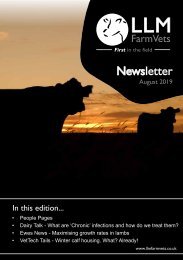LLM Farm Vets Newsletter June 2019
this month we’re trying to do our bit with the global plastic problem - every little helps. Rob Howe gives us a very in-depth look at why dung beetles are good for farms. Dan Stevenson discusses scab in Ewes News and Steph highlights the benefits of worm egg counts towards combating wormer resistance. We hope you enjoy! And as always, any questions, give us a shout.
this month we’re trying to do our bit with the global plastic problem - every little helps. Rob Howe gives us a very in-depth look at why dung beetles are good for farms. Dan Stevenson discusses scab in Ewes News and Steph highlights the benefits of worm egg counts towards combating wormer resistance.
We hope you enjoy! And as always, any questions, give us a shout.
You also want an ePaper? Increase the reach of your titles
YUMPU automatically turns print PDFs into web optimized ePapers that Google loves.
With summer nearly here and the<br />
weather warming up it is important<br />
to worm your fat lambs effectively.<br />
If you have already wormed your<br />
lambs, are you sure your wormer<br />
has worked effectively? With<br />
increasing resistance to wormers<br />
reported across the industry, Steph<br />
is here to tell us more.<br />
It is important to test if worming is<br />
required by sending in regular faecal<br />
samples from at least 10 animals for<br />
a VetTech to perform a Faecal Egg<br />
Count (FEC) before you worm your<br />
lambs. It is useful to send in a follow<br />
up sample 14 days post worming,<br />
except if you have used those from<br />
the yellow group, “levamisoles” which<br />
is 7 days post worming. If this “postworming”<br />
FEC does not show a 95%<br />
reduction of worm eggs, then there<br />
is a resistance problem in your flock.<br />
Our SQP’s and vets will be able to<br />
advise you on the most effective and<br />
appropriate worming plan for your farm<br />
using your results.<br />
Resistance is a big problem. Ineffective<br />
wormers cost the sheep industry £84<br />
million a year including extra feed and<br />
time needed to get lambs to finishing<br />
weights.<br />
tails<br />
The use of faecal worm egg counts to reduce worm<br />
resistance.<br />
White group wormers (Benzimidazoles)<br />
are the most commonly used wormers<br />
against Nematodirus in lambs.<br />
However, they have 94% resistance<br />
on the majority of farms in the UK.<br />
Yellow wormers (Levamisoles) have<br />
68% resistance and 50% resistance is<br />
found in clear wormers (Ivermectins)<br />
with new cases of resistance being<br />
found in the newest worming group,<br />
the Orange wormers. With increasing<br />
levels of resistance, it is critical to<br />
plan ahead and prevent this causing a<br />
problem on your farm.<br />
The VetTechs are currently running<br />
an offer of a “half price post-worming<br />
FEC” when following a pre-worming<br />
FEC. The benefits of using regular<br />
Faecal Egg Counts:<br />
• Diagnose worm issues sooner<br />
– which will reduce production<br />
losses.<br />
• Estimate the level of infection –<br />
which will allow you to monitor the<br />
need to worm saving you time and<br />
money.<br />
• Allow you to target timing of dosing<br />
– improving the effectiveness of<br />
treatment and productivity.<br />
• Monitor whether treatment has<br />
worked – do you need to dose<br />
again sooner or use a different<br />
product.<br />
• Detect worm resistance.<br />
13





